
The Three Stigmata of Palmer Eldritch is a 1965 science fiction novel by Philip K. Dick. It was nominated for the Nebula Award for Best Novel in 1965.

The Rest of the Robots is a collection of eight short stories and two full-length novels by American writer Isaac Asimov, published in 1964. The stories, centred on positronic robots, are all part of the Robot series, most of which take place in the Foundation universe. Another collection of short stories about robots, I, Robot, was re-published in the previous year, which is why Asimov chose to title the collection as The Rest of the Robots. None of the short stories in this collection were in I, Robot, however all of them were later included in The Complete Robot, and both novels about Elijah Baley were also published separately.

The Past Through Tomorrow is a collection of science fiction stories by American writer Robert A. Heinlein, all part of his Future History.

The Big Time (1958) is a short science fiction novel by American writer Fritz Leiber. Awarded the Hugo Award during 1958, The Big Time was published originally in two parts in Galaxy Magazine's March and April 1958 issues, illustrated by Virgil Finlay. It was subsequently reprinted in book form several times. The Big Time is a story involving only a few characters, but with a vast, cosmic back story.

Time and Stars is a collection of science fiction short stories by Poul Anderson, published in 1964.

"If There Were No Benny Cemoli" is a science fiction short story by American writer Philip K. Dick, first published in the December, 1963 issue of Galaxy magazine with illustration by Lutjens.

The Squares of the City is a science fiction novel written by John Brunner and first published in 1965 (ISBN 0-345-27739-2). It was nominated for the Hugo Award for Best Novel in 1966.
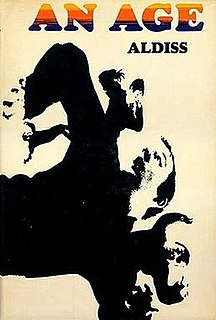
An Age is a 1967 science fiction novel by English writer Brian Aldiss. The book, set principally in 2093, combines the popular science fiction themes of time travel, totalitarian dystopia, and the untapped potential of the human mind. It was nominated for a Ditmar Award in 1969 in the "Best International Science Fiction of any length, or collection" category.
"Sunjammer" is a science fiction short story by British writer Arthur C. Clarke, originally published in the March 1964 issue of Boys' Life,. The story has also been published under the title "The Wind from the Sun" in Clarke's 1972 collection of short stories with this title. It depicts a yacht race between solar sail spacecraft.
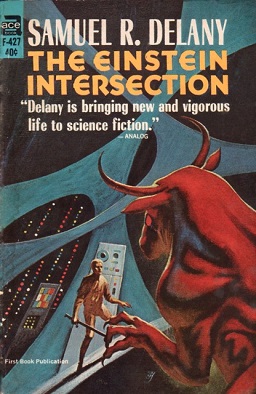
The Einstein Intersection is a 1967 science fiction novel by Samuel R. Delany. It won the Nebula Award for Best Novel in 1967 and was nominated for the Hugo Award for Best Novel in 1968. Delany's intended title for the book was A Fabulous, Formless Darkness.

"Mars Is Heaven!" is a science fiction short story by American writer Ray Bradbury, originally published in 1948 in Planet Stories. "Mars Is Heaven!" was among the stories selected in 1970 by the Science Fiction Writers of America as one of the best science fiction short stories published before the creation of the Nebula Awards. As such, it was published in The Science Fiction Hall of Fame Volume One, 1929–1964. It also appears as the sixth chapter of The Martian Chronicles, retitled "The Third Expedition".

Great Science Fiction Stories About Mars is a 1966 anthology of science fiction short stories edited by T. E. Dikty and published by Fredrick Fell. Most of the stories had originally appeared in the magazines Startling Stories, Argosy, Thrilling Wonder Stories, Amazing Stories, Super Science Stories and Astounding SF.
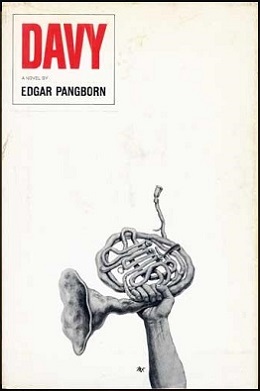
Davy is a post-apocalyptic science fiction novel by American writer Edgar Pangborn, nominated for the 1965 Hugo Award. It is set in the Northeastern United States some centuries after an atomic war ended high-technology civilization, with some scenes on an unnamed Atlantic island.
Orbit 1 is a 1966 science fiction short story anthology edited by American writer Damon Knight.
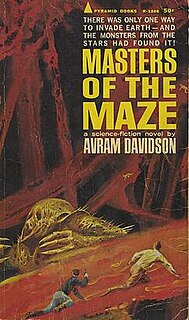
Masters of the Maze is a science fiction novel by American writer Avram Davidson, originally published in 1965 by Pyramid Books with a cover by John Schoenherr. The first UK edition, the only hardcover to date, was issued by White Lion in 1974. An American paperback reprint followed from Manor Books in 1976. Ebook editions appeared in 2012, from both Prologue Books and SF Gateway.
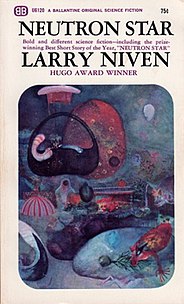
Neutron Star is a collection of science fiction short stories by American writer Larry Niven, published in April 1968. The individual stories were published in If and Galaxy Science Fiction in 1966–1967, under Frederik Pohl as editor.

Why Call them Back From Heaven? is a 1967 novel by Clifford D. Simak, which became the initial volume in the Ace Science Fiction Specials line.





















